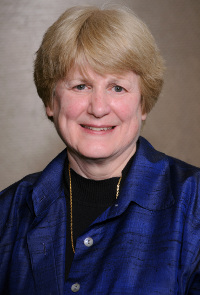Mary-Claire King: Research That Matters
American Cancer Society grants have supported Mary-Claire King’s groundbreaking work in genetics
When Mary-Claire King, Ph.D., now an American Cancer Society Research Professor at the University of Washington, discovered the genetic mutation that’s responsible for 5–10% of all breast cancers, the world was changed. Women who had suspected a genetic cause for the increased risk within their families had an answer, and the scientific world was enlightened to the link between genetics and other cancers and diseases – leading to more advancements in research.
 King’s two decades of work (1974–94) culminated in her discovery of BRCA1, the “inherited breast cancer gene.” In 1995, the Society encouraged her continued work by naming her an American Cancer Society Research Professor, a status made possible with an endowment by the Walt Disney family.
King’s two decades of work (1974–94) culminated in her discovery of BRCA1, the “inherited breast cancer gene.” In 1995, the Society encouraged her continued work by naming her an American Cancer Society Research Professor, a status made possible with an endowment by the Walt Disney family.
“I was overwhelmed to be selected,” says King. “The funding has allowed me to strike out in ways that are far more risky than federal funding would permit. Private foundation support, in general, celebrates risk-taking. I think that’s why I was selected in the first place. And Society support has been an important part of that.”
King’s recent work has focused on “inexpensive, complete, accurate ways of finding and characterizing every mutation in every known breast cancer gene – now there are about 20 – and ensuring testing is available to women in general.” She adds, “I’ve been able to keep going and it’s been enormously successful; we’re saving tens of thousands of lives.”
Beginning spring 2013, moviegoers in select theaters across the United States and Canada could see how King’s findings translate to real lives via Decoding Annie Parker. The film ties King’s work to Parker’s real-life experience with BRCA1, which included the loss of her mother and sister as well as her own diagnosis.
It’s a dramatic, traumatic story, but one with a glimmer of hope that conveys the nature of research: “If we have learned anything in the history of science in the Western world, it’s that science is immensely beneficial to solving problems of health, but that does not happen quickly,” says King. “And research grants matter enormously—we couldn’t get anywhere without donors.
“I think of Society grants the way I think of money that I earn,” continues King. “Every dime, every dollar is accounted for, is used very frugally and goes to research that matters.”
This article originally appeared in the Fall-Winter 2013 Edition of Triumph magazine, published by Pace Communications and the American Cancer Society. Reprinted with permission.
- Helpful resources
- For researchers
American Cancer Society news stories are copyrighted material and are not intended to be used as press releases. For reprint requests, please see our Content Usage Policy.



